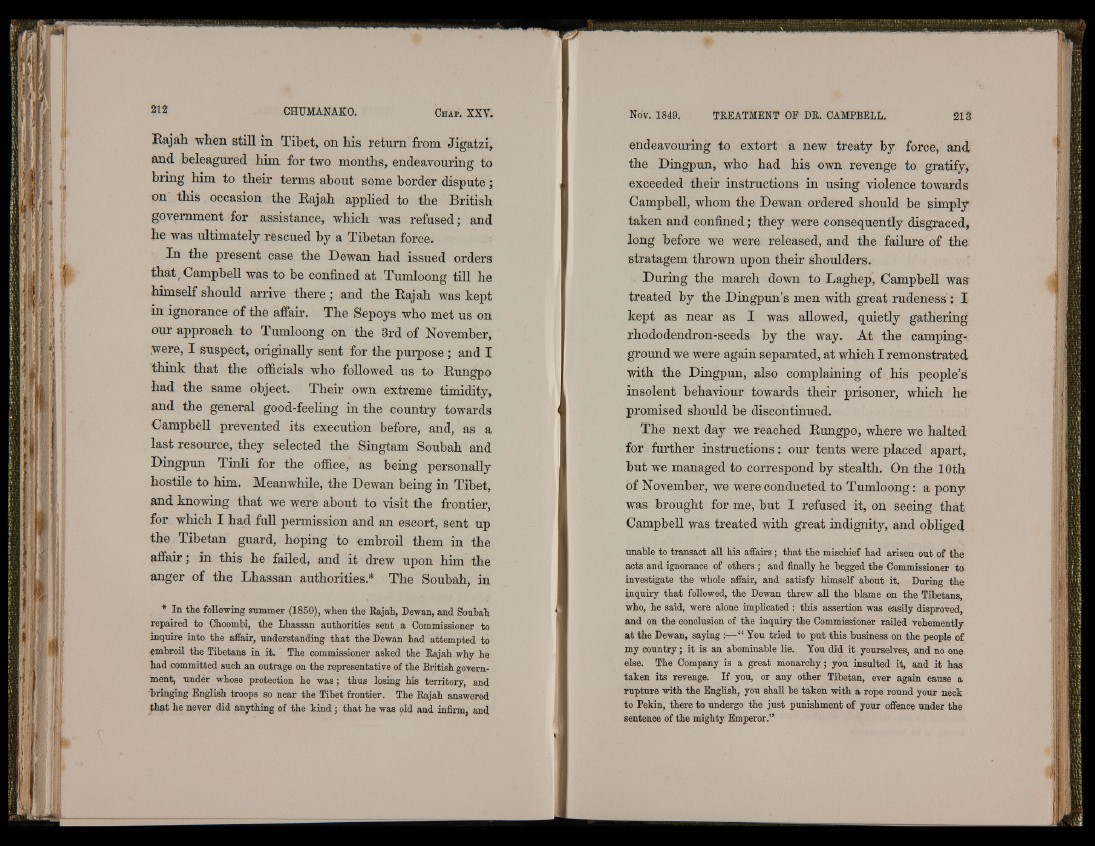
Rajah when still in Tibet, on his return from Jigatzi,
and beleagured him for two months, endeavouring to
bring him to their terms about some border dispute ;
on this occasion the Rajah applied to the British
government for assistance, which was refused; and
he was ultimately rescued by a Tibetan force.
In the present case the Dewan had issued orders
*hat, Campbell was to he confined at Tumloong till he
himself should arrive th e re ; and the Rajah was kept
in ignorance of the affair. The Sepoys who met us on
our approach to Tumloong on the 3rd of November,
were, I suspect, originally sent for the purpose; and I
think that the officials who followed us to Rungpo
had the same object. Their own extreme timidity,
and the general good-feeling in the country towards
Campbell prevented its execution before, and, as a
last resource, they selected the Singtam Soubah and
Dingpun Tmh. for the office, as being personally
hostile to him. Meanwhile, the Dewan being in Tibet,
and knowing that we were about to visit the frontier,
for which I had full permission and an escort, sent up
the Tibetan guard, hoping to embroil them in the
affair; in this he failed, and it drew upon bfm the
anger of the Lhassan authorities.* The Soubah, in
* In the following summer (1850), when the Rajah, Dewan, and Sonbah
repaired to Choombi, the Lhassan authorities sent. a Commissioner to
inquire into the affair, understanding that the Dewan had attempted to
embroil the Tibetans in it. The commissioner asked the Rajah why he
had committed such an outrage on the representative of the British government,
under whose protection he was; thus losing his territory, and
bringing English troops so near the Tibet frontier. The Rajah answered
that he never did anything of the kind; that he was old and infirm, and
endeavouring to extort a new treaty by force, and
the Dingpun, who had his own revenge to gratify,
exceeded their instructions in using violence towards
Campbell, whom the Dewan ordered should be simply
taken and confined; they were consequently disgraced,
long before we were released, and the failure of the
stratagem thrown upon their shoulders.
During the march down to Laghep, Campbell was
treated by the Dingpun’s men with great rudeness ; I
kept as near as I was allowed, quietly gathering
rhododendron-seeds by the way. At the camping-
ground we were again separated, at which I remonstrated
with the Dingpun, also complaining o f . his people’s
insolent behaviour towards their prisoner, which he
promised should be discontinued.
The next day we reached Rungpo, where we halted
for further instructions; our tents were placed apart,
but we managed to correspond by stealth. On the 10th
of November, we were conducted to Tumloong: a pony
was brought for me, but I refused it, on seeing that
Campbell was treated with great indignity, and obliged
unable to transact all his affairs; that the mischief had arisen out of the
acts and ignorance of others ; and finally he begged the Commissioner to
investigate the whole affair, and satisfy himself about it. During the
inquiry that followed, the Dewan threw all the blame on the Tibetans
who, he said, were alone implicated : this assertion was easily disproved,
and on the conclusion of the inquiry the Commissioner railed vehemently
at the Dewan, saying :—“ Tou tried to put this business on the people of
my country; it is an abominable lie. You did it yourselves, and no one
else. The Company is a great monarchy; you insulted it, and it has
taken its revenge. If you, or any other Tibetan, ever again cause a
rupture with the English, you shall be taken with a rope round your neck
to Pekin, there to undergo the just punishment of your offence under the
sentence of the mighty Emperor.”